New SGA officers plan to focus on students’ interests
June 12, 2013
Students who want their voice to be heard and taken seriously on campus should bring ideas and concerns to the Student Government Association (SGA), said Laura Giles, SGA president.
“Every student on this campus needs to know what SGA is, so that they can feel comfortable coming to us,” Giles said. “Every student has a right for (his or her) voice to be heard, but the faculty and staff are not going to go out and find random people to talk to about campus issues; they are going to come to SGA.”
SGA is a governing body of students who work alongside faculty and staff to benefit the campus community through the passing of legislation and the planning of events. These tasks are divided between two branches: Senate, the legislative body of SGA, and University Program Council (UPC), the event planning branch of SGA, Giles said. These two branches work with Freshman Forum to be the voice of the student body, Giles said.
“We really focus on the interests of the students and don’t make decisions without putting their opinions into consideration,” said Nikki Messer, vice president of SGA senate.
UPC is designed to be the most visible branch of SGA because members are regularly hosting events all over UNA, said Walter Hartley, vice president of UPC.
“One of the biggest reasons we are here is to be the voice of the students, but the students have to allow us to be their voice,” Giles said.
One of SGA’s biggest accomplishments in the 2012-2013 school year was the SGA 5K, which raised exactly $3,100 for the SGA endowed scholarship fund, Giles said.
“We have about $10,000 left to raise on the endowed scholarship,” she said. “I think we can accomplish that goal in the next year, because it is one of the biggest things we can give back to the students.”
Messer said the Senate has been working to make the internal legislative process more efficient, and has recently passed a bill that, if approved by university officials, will put GPS systems on university shuttle buses so students can track bus locations on their phones via the UNA mobile app.
“We think that is going to be really beneficial for students,” she said. “We had to raise the transportation fee by $2, and if the bill is passed by the faculty and staff senate, it will go into effect sometime next year.”
Messer and Hartley said poor work ethic and lack of student participation in SGA have been serious issues that they hope to continue repairing in the upcoming school year.
“I feel like there isn’t an effective way the students have been informed about SGA in the past year,” said Andy Page, a sophomore at UNA. “I believe SGA may be doing their job but they aren’t doing it efficiently.”
Giles said she believes students have not felt comfortable approaching SGA and consequently, are not aware of SGA’s impact on campus.
“SGA does make a difference, and students need to know that,” Messer said. “If you come to us, we are going to follow up.”
Hartley said UPC will be working closely with the other branches in the next year to help SGA stay visible and accountable to the student body.
“I would like to see UPC play a vital role in the endowed scholarship,” he said. “We can openly show what’s going on in SGA through our events.”
Heather Steadman, a sophomore at UNA, said she believes SGA has done a lot of great things behind the scenes for students.
“They were responsible for putting in the speed bumps in front of Lagrange (Hall) a couple of years ago,” she said. “I know a couple of people in SGA, and they really listen to you if you have a problem. They genuinely care about their fellow students and (about) making UNA a better place.”











